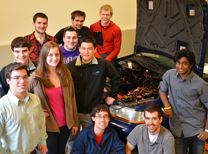Electrifying cars, one fleet at a time

Voltaic team
In 1909 Henry Fold laid down the law: “Any customer can have a car painted any color that he wants so long as it is black.” Today, consumers who want their favorite car to be electric instead of gas-powered will confront a similar lack of options. The problem is that retrofitting drive trains on an existing fleet to run electrically is prohibitively expensive. That will change if Voltaic Drive Systems succeeds.
Voltaic won 2011 Grand Prize of the University of Washington Environmental Innovation Challenge (EIC), produced by the Foster School of Business Center for Innovation and Entrepreneurship in partnership with the UW College of Engineering and UW College of the Environment. The team drove away with $10,000 after besting teams across Washington with a 2002 Honda Accord fitted with their V-EV Drive Module. Their prototype demonstrated that a module component approach could provide automotive companies with the ability to produce electric models of current gasoline vehicles quickly and affordably, bypassing expensive redesign costs.
On the heels of winning the Challenge, Voltaic was awarded a $700,000 competitive EcoCar 2 grant from the US Department of Energy and General Motors. Sixteen universities across North America are competing to reduce the environmental impact of a Chevrolet Malibu without compromising performance, safety and consumer acceptability. The ideal vehicle will generate limited or zero pollution, have a range of 300 miles and be fuel-efficient.
James Barger, Voltaic’s VP of finance is upbeat about their chances. “The EIC provided us with great experience in developing a drive train. We built that working prototype in four months, and we think that will give us an edge in the EcoCar competition.”
UW mechanical engineering Professor Brian Fabien worked with the Voltaic UW senior design team of Trevor Crane and Trevor Fayer, and was impressed by their talent and skills. “It was obvious that these students had extraordinary leadership qualities,” he said. “The module was their idea and their implementation.”
If Voltaic succeeds, it will be a win all around: greener vehicles, lower costs for the car maker and more choice for consumers.
